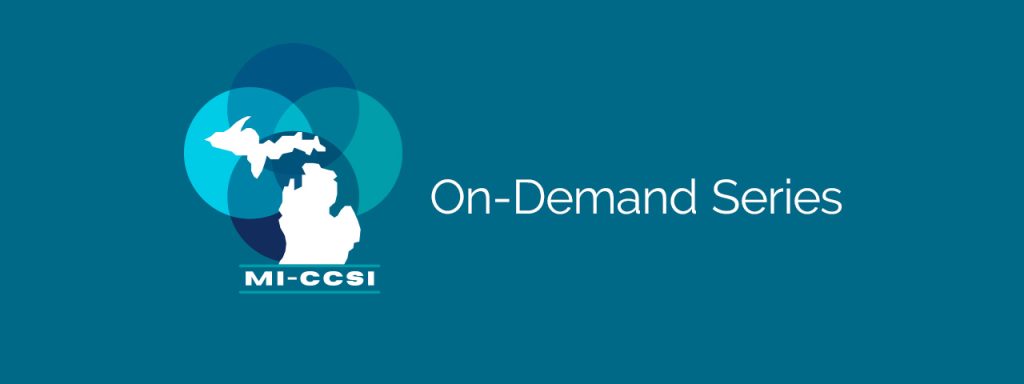

Serious Illness: Serious Illness Conversation Guidance
Serious Illness: Serious Illness Conversation Guidance – Recorded (On Demand) Training
Serious Illness: Guidance on the Serious Illness Conversation
This learning series is comprised of three independent vignettes that were created to address the understanding and confidence of having a serious illness conversation. In the vignettes the learner will explore the purpose of a serious illness conversation, the difference from an advance directive, and the three key components of the Serious Illness Guide. These vignettes are organized as three independent learning activities that can be completed separately or as the whole series. The learning series complements the all-day Serious Illness training. To expand the learnings on managing populations with a serious illness, it is highly recommended to take the all-day Serious Illness training.
At the completion of this learning series, the learner will be able to:
- state the difference between a serious illness conversation and an advance directive.
- state the purpose of a serious illness conversation.
- define three components of the serious illness guide.
Successful completion includes:
- Participate in each desired learning activity.
- Complete the course evaluation after each to obtain continuing education credits.
Click here to participate in this training.
Session#1: Serious Illness Conversation Guidance: Difference Between a SI Conversation & Advance Directive
This online learning activity kicks off a series on advanced care planning. In this vignette between Dr. Ellen Fink-Samnick and Dr. Mary Beth Billie, the discussion centers around the importance of serious illness conversations, especially from the perspective of primary care providers.
Key topics include definitions, identifying patients with serious illnesses, and the role of primary care providers in facilitating these crucial conversations. The vignette highlights the need for training, the rewarding nature of these discussions, and addresses barriers to effective communication, such as lack of training, time constraints, and prognostic uncertainty.
Total Time: 17 minutes
Session#2: Serious Illness Conversation Guidance: Review the Purpose of the Serious Illness Conversation
In this online learning activity, Dr. Mary Beth Billie interviews Dr. Keith Veselik, a primary care physician and Chief Medical Officer for Population Health at Loyola Medicine, about serious illness communications.
Dr. Veselik shares his experiences and insights on conducting value-based conversations with patients, emphasizing the importance of primary care physicians initiating these discussions early. He discusses the evolution of his approach over his 30-year career and highlights the significance of understanding patient values, their last chapter wishes, and incorporating functional status into care planning. Dr. Veselik also recounts personal experiences, both successes and challenges, in managing end-of-life care and underscores the critical role of a multidisciplinary team in supporting patients and easing the burden on families.
Total Time: 16 minutes
Session#3: Serious Illness Conversation Guidance: The 3 Components of Serious Illness Conversation Guide
In this online learning activity, Dr. Billie demonstrates the serious illness conversation between provider and patient focusing on the patient’s recent health struggles. They discuss his hospitalization experience, current health condition, concerns about the future, and what matters most to him. The provider aims to gain a better understanding of the patient’s priorities and goals moving forward and suggests involving the family in these discussions and exploring options to better manage symptoms at home.
Total Time: 10 minutes
Audience
The course is intended for nurses, social workers, advanced practice providers, medical assistants, community health workers and other care team members who are seeking to expand their knowledge and skills.
Cost
This training is made available through funding from Blue Cross Blue Shield of Michigan.
FREE for members; FREE for non-members
All enduring learning activities are at NO COST to the participant.
CONTINUING EDUCATION CREDITS
Nurses
Providers & Nurses:
The AAFP has reviewed Serious Illness Conversation Guidance, and deemed it acceptable for AAFP credit. Term of approval is from 04/30/2024 to 04/03/2025.
Providers should claim only the credit commensurate with the extent of their participation in the activity.
# of credits available: up to 0.75
AMA/AAFP Equivalency:
AAFP Prescribed credit is accepted by the American Medical Association as equivalent to AMA PRA Category 1 credit(s)™ toward the AMA Physician’s Recognition Award. When applying for the AMA PRA, Prescribed credit earned must be reported as Prescribed, not as Category 1.
Nurses:
Note: Nurses can use CME credits toward re-licensure.
Michigan Board of Nursing Continuing Education Requirements Details
Questions
If you have any questions, contact Amy at amy.wales@miccsi.org